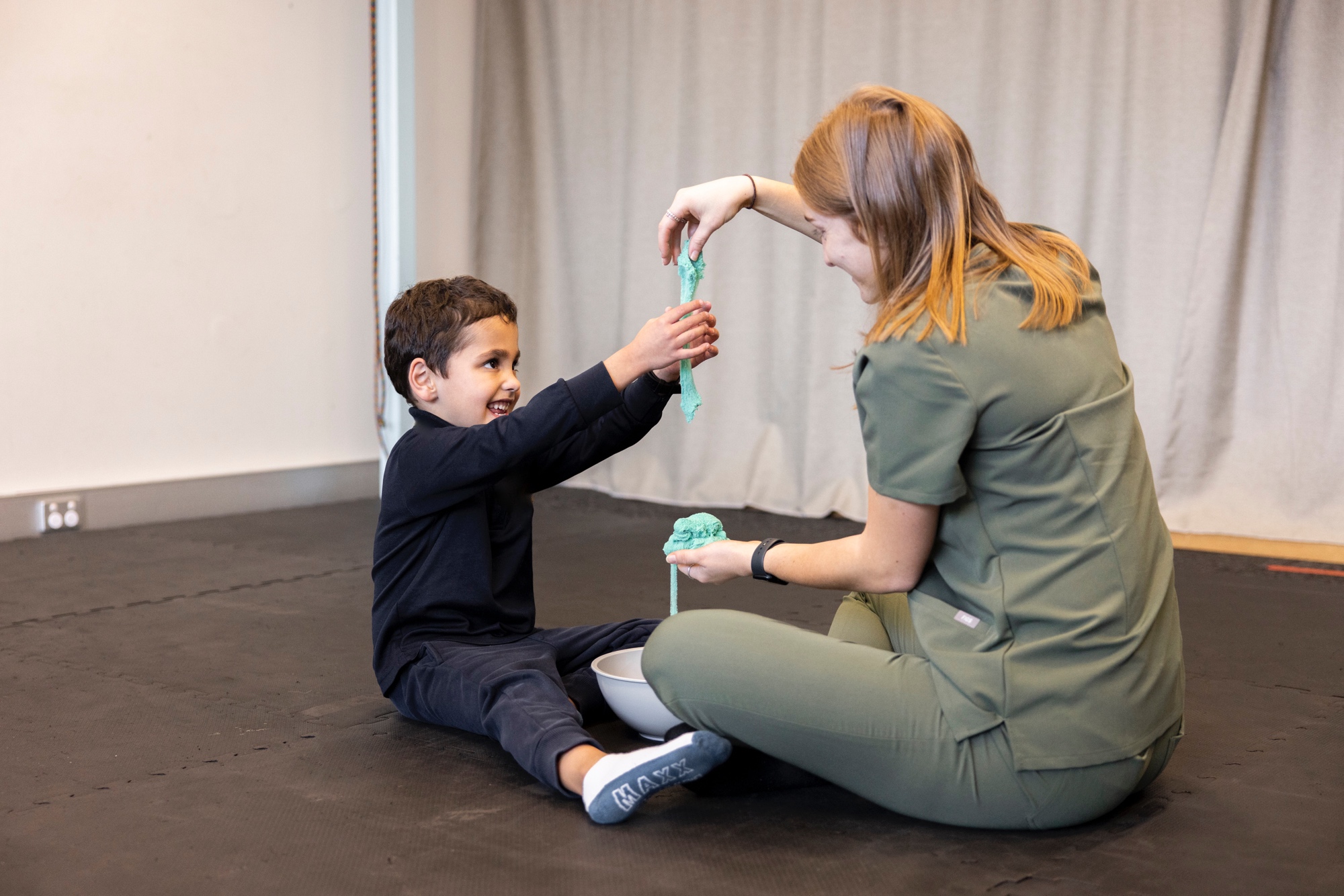- need instructions repeated
- respond negatively to everyday sounds
- tune out or seems disinterested
- have difficulty sequencing
- sequencing to re-tell stories and events
- hears well when it is quiet yet distracted if there is a lot of noise

Sensory integration
Sensory support

Listening
The listening (auditory) system supports the ability to recognise and interpret sounds, follow instructions and organise oneself in time and space. When this ‘app is still downloading’ for a child they may need therapy support when we see the following often happening:

Touch
The touch (tactile) system supports the development of a child’s body map, fine motor skills and supports social and emotional development. When this ‘app is still downloading’ for a child they may need therapy support when we see the following often happening:
- avoid getting hands messy in play
- react negatively to aspects of dressing i.e. certain fabrics, seams in socks
- show distress when people are around i.e. in a crowd, lining up
- have a low or high pain threshold
- need to constantly touch or fiddle
- difficulty managing cutlery, buttons, puzzles

Visual
The vision (visual) system helps to recognise similarities and differences, track an object such as a ball or along a line of print. When this ‘app is still downloading’ for a child they may need therapy support when we see the following often happening:
- have difficulty finding an object in competing backgrounds
- look carefully or intently at people
- have letter reversals in writing
- shields eyes from lights or insists on wearing a hat
- have difficulty putting puzzle together
- seem to attend to ‘parts’ of a project, has difficulty attending to the ‘whole’

Taste
The taste (gustatory) system helps to distinguish taste sensations (sweet, sour, bitter, salty, and umami). Taste, along with texture and temperature of food combined with our sense of smell, produces a perception of flavour. When this ‘app is still downloading’ for a child they may need therapy support when we see the following often happening:
- have a limited food repertoire
- insist food to be separated on a plate
- insist food be presented in a specific way
- have a strong preference for certain foods or textures
- act as though all foods taste the same

Smell
The smell (olfactory) system helps to distinguish between a variety of odours and contributes to create the sensation of flavour. When this ‘app is still downloading’ for a child they may need therapy support when we see the following often happening:
- deliberately smells food and non-food objects
- has an aversive response to everyday smells – this can impact mealtime preferences

Body position
The body position system (proprioceptive) enables us to understand where our body is in our environment to tell how and where to move the body with the right amount of force and speed, such as making adjustments when walking on sand or concrete. When this ‘app is still downloading’ for a child they may need therapy support when we see the following often happening:
- appear clumsy or ‘accident prone’
- tire easily i.e. at the table or standing
- seem to do things in inefficient ways i.e. putting extra steps when walking
- not know own strength
- have trouble starting or ending activities
- prefer to do the same play activities
- take longer to learn new skills i.e. dressing, riding a bike

Movement
The movement (vestibular) system supports muscle tone, posture, the ability to use both sides of the body at the same time (bilateral motor coordination), balance, orientation in space and eye movements. It is also responsible for attention and arousal levels as well as self-regulation. When this ‘app is still downloading’ for a child they may need therapy support when we see the following often happening:
- be fearful of stairs or elevators
- constantly seeking movement and is ‘on the go’
- have difficulty with attention and focus
- have reduced emotional regulation
- have challenges with balance
- rock unconsciously during activities i.e. while watching T.V
- feel like a sack of potatoes when you try to support moving them into a position
- have poor seated posture at the table

Internal regulation
The internal body cues (interoception) system regulates what is going on inside the body such as vital functions i.e. body temperature, hunger, thirst, pain. When this ‘app is still downloading’ for a child they may need therapy support when we see the following often happening:
- leave going to the toilet to the last minute
- need a reminder to take jumper off when hot
- have difficulty feeling and interpreting emotions
- may over eat to avoid feeling of hunger
- may not eat enough as often as doesn’t feel hunger or thirst
